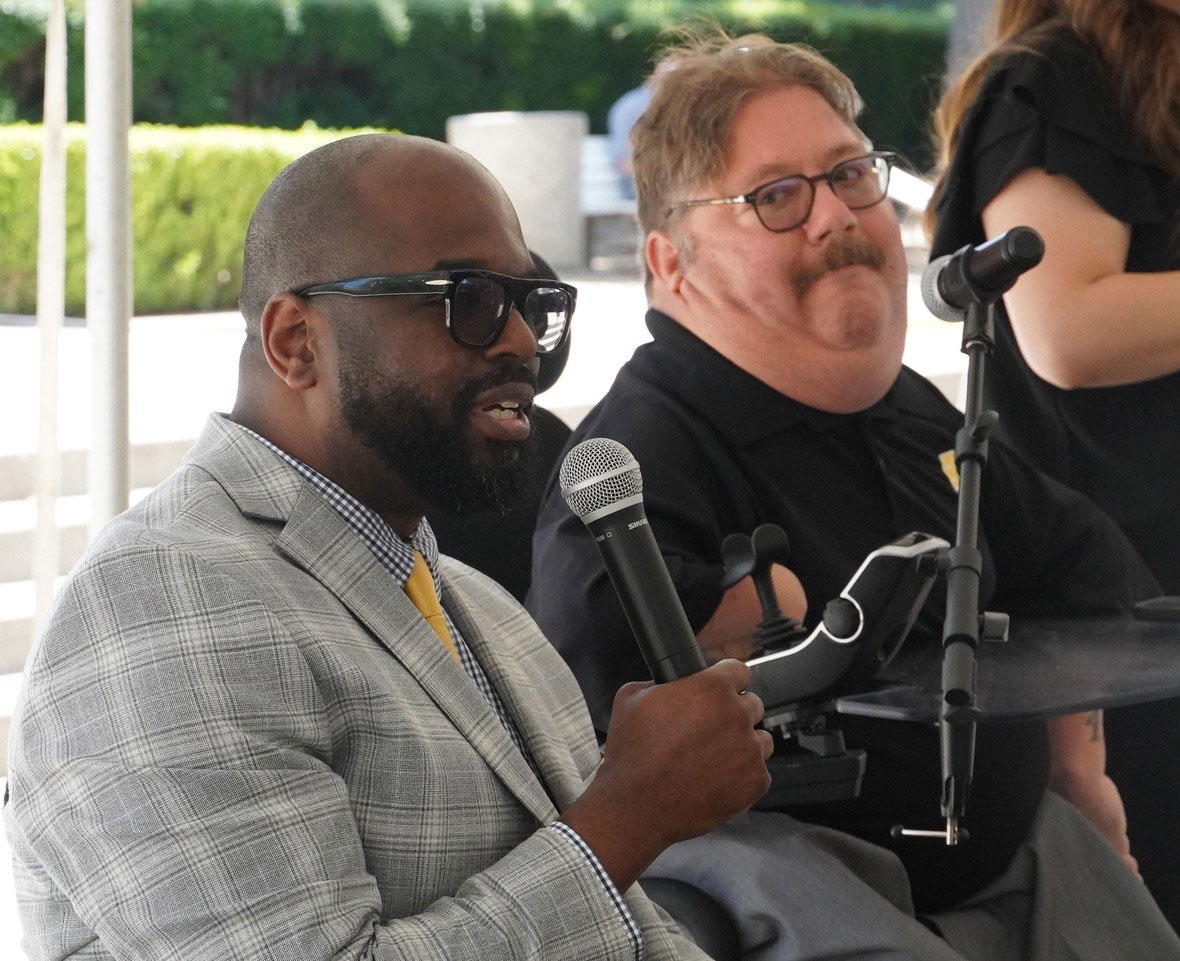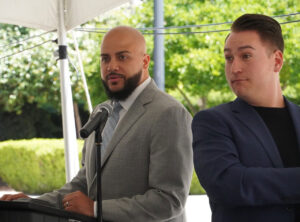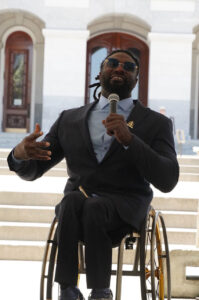Disabled Californians Promise to Fight Back as Sacramento Proposes Cuts to Services They Rely On
The California Disability Leadership Alliance (The Alliance) held its “Day at the Capitol” event on June 16, organized to advocate for policies and services that improve the lives of people with disabilities. The effort’s leaders also want to strengthen what they refer to as “cross-disability collaboration” in the state.

By Antonio Ray Harvey | California Black Media
The California Disability Leadership Alliance (The Alliance) held its “Day at the Capitol” event on June 16, organized to advocate for policies and services that improve the lives of people with disabilities. The effort’s leaders also want to strengthen what they refer to as “cross-disability collaboration” in the state.
Eric Harris, Associate Executive Director at the Sacramento-based Disability Rights California (DRC), said voices representing people with disabilities need a seat at the table when decisions are being made.
He added that people with limited abilities won’t “sit or stand” for some of the budget reductions some lawmakers and the Governor’s office are proposing that will directly impact them.
“It’s really important that folks in that building (State Capitol) hear us and see us,” said Harris, who is also an attorney.
“We’re not going to go for coercive approaches to mental health and homelessness, Harris continued. “We’re not going to stand for cuts to services that we depend on every day, including in-home support services.”
The Alliance of organizations that participated in the “Day at the Capitol” event was comprised of leaders from disability advocacy and service-focused organizations, including DRC, the California Foundation for Independent Living Services (CFILS), NorCal Services for Deaf and Hard of Hearing, Disability Rights Education and Defense Fund, and Cal Voices.
“We need this moment of power,” said Russell Dawson Rawlings, CFILC’s Communications and Strategic Partnerships Manager.

Alongside a sign language interpreter, Asm. Isaac Bryan (D-Ladera Heights), left, shares his experiences of living in foster care with individuals with disabilities. CBM photo by Antonio Ray Harvey.
Assemblymember Isaac Bryan (D-Ladera Heights), known for his advocacy work on issues related to disability rights, was one of the guest speakers, along with Assemblymember Liz Ortega (D-Hayward).
Bryan, the vice chair of the California Legislative Black Caucus, said he and Assemblymember Tom Lackey (R-Palmdale) are working on a number of bipartisan bills focused on improving disability services. He also shared that he and other lawmakers are concerned about probable cuts to the In-Home Supportive Services (IHSS) program.
Gov. Gavin Newsom’s proposed budget cuts for the IHSS program include a reduction of $707.5 million in General Fund spending, mostly through capping provider overtime and travel hours from 66 hours per week to 50.
The IHSS program provides in-home assistance to eligible aged, blind, and disabled individuals.
Bryan said his mother’s experiences as a care worker and a foster parent brace his commitment to advocating for people living with disabilities.
His own memories, too, of growing up in foster care as one of the “hardest to place cases,” and having experienced “deep trauma” and knowing other youth with “multiple disabilities” also drive his passion.
“As a legislator, it is important for me to do all that I can so that all of our policies that we move in this big building are just like my mother –someone who sees everybody, inclusive of everybody, and fights for sensibility for everybody,” Bryan said.
“When the governor put out his May Revise Budget and he had major cuts to IHSS with new income restrictions on Medi-Cal, we pushed back. We pushed back hard,” Bryan said. “We were able to stop those cuts to IHSS.”
According to the Department of Justice’s Civil Rights Division, California disabilities are “broadly defined” as conditions that hinder a major life activity, including physical and mental disabilities.
The California Department of Health Care Services (DHCS) reported that one in four adults living in California has a disability. Individuals with disabilities have a higher frequency of certain diseases, higher rates of morbidity and mortality, and risk factors for poor health.
A December 2023 survey by the California Health Care Foundation (CHCF) found that Black Californians with disabilities are more likely than those without disabilities to be covered by Medi-Cal (30% vs. 20%) or Medicare (32% vs. 14%), and less likely to have private insurance (34% vs. 64%).
That same survey revealed that approximately 19% of Black Californians reported having a disability, and people in that group are frequent users of the health care system.
The Los Angeles-based, Black-owned research firm EVITARUS conducted the “Listening to Black Californians” study for CHCF in 2021.
Assemblymember Jeff Gonzalez (R-Indio) says he has a personal reason to be concerned about cuts to IHHS. He is father to a son named R.J., who has severe disabilities due to Cerebral Palsy (CP) with spastic quadriplegia, the most severe form of CP.
Gonzalez told California Black Media (CBM) that R.J. needs personal care “around the clock” — a wheelchair assistant, nutrition, hygiene, medication, therapy, and social interaction.
Gonzalez feared that cutting in-home care workers’ hours would lead to multiple issues. Parents would have to spend more time at home than work. It could also lead to patients experiencing severe depression should they be unable to communicate their needs, or it could leave parents with no choice but to place their loved ones in mental institutions.
“The governor’s proposal to reduce IHHS overtime hours from 70 to 50 hours isn’t just a budget cut. It’s a direct blow to families like mine,” Gonzalez said. “It means fewer hours of trained care. It means that a parent working full-time as a caregiver may suddenly lose critical hours of paid support and may be forced to go it alone.”

Paralympian Matt Scott talks about his experience of thriving in adaptive sports. CBM photo by Antonio Ray Harvey.
Matt Scott, a Black five-time Paralympian and two-time gold medalist for Team USA Wheelchair Basketball, was one of the speakers at the event held in front of the State Capitol. He said people with disabilities are connected to a “capable community,” but services that are offered by the state are sorely needed.









